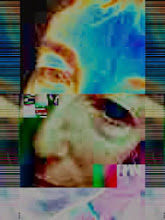
Like me, Mama is a writer. She has published articles in academic journals such as Journal of Communication Inquiry, Critical Studies in Media Communication & Journalism & Mass Communication Quarterly to name only 3. Those papers report on research findings & draw in particular on the theoretical frameworks of British cultural studies, (post-) structuralism and the knowledge-power nexus that Foucault wrote about so eloquently. She also owes a special debt to Roland Barthes.
Page proofs for a paper to be published in Qualitative Inquiry have been corrected & returned to the editor. This works marks a departure in style although her concerns remain the same. She considers this a performance piece; the late Spaulding Gray was an inspiration.
I'd like to pay a special tribute to Mama by previewing her work for you, my loyal readers/friends. Please read the abstract below.
“Peering Through the Crack
& Good-Bye to All That:
30 years of TV, Telephones,
Sports, Drugs, Etc.”
Elli Lester Roushanzamir
University of Georgia—Athens
Social relationships are enacted and remembered through interpersonal relationships and replayed through the media as the author uses a defining personal
experience, that of her son’s drug addiction, to rethink, analyze, and resituate
herself in the world. The result draws attention to the messy juxtaposition of
social structures and policies with personal loss, grief, anger, and episodes of
joy and courage. Crack, whether drug, fissure, gibe, highlights remembered
fragments which allow the author to tell her stories in ways other than those
originally considered. As those personal stories are interwoven with public
moments such as school desegregation and changes in telecommunications
and popular culture, a social commentary is offered that defamiliarizes the
familiar, evokes rather than represents, and therefore offers the reader entry
into the narrative, the cultural critique.
Keywords: autoethnography; substance abuse; crack cocaine; popular
culture; mass media
& Good-Bye to All That:
30 years of TV, Telephones,
Sports, Drugs, Etc.”
Elli Lester Roushanzamir
University of Georgia—Athens
Social relationships are enacted and remembered through interpersonal relationships and replayed through the media as the author uses a defining personal
experience, that of her son’s drug addiction, to rethink, analyze, and resituate
herself in the world. The result draws attention to the messy juxtaposition of
social structures and policies with personal loss, grief, anger, and episodes of
joy and courage. Crack, whether drug, fissure, gibe, highlights remembered
fragments which allow the author to tell her stories in ways other than those
originally considered. As those personal stories are interwoven with public
moments such as school desegregation and changes in telecommunications
and popular culture, a social commentary is offered that defamiliarizes the
familiar, evokes rather than represents, and therefore offers the reader entry
into the narrative, the cultural critique.
Keywords: autoethnography; substance abuse; crack cocaine; popular
culture; mass media

2 comments:
Very, very cool (as in terrific). I had the privilege of reading it already, and know others will find it as intriguing as I did.
FROM SOBHAN:
Dear Elle
I think you have a marvellous talent for writing the novels and stories, which include scientific and fantastical points for audiences. Sure, because you are an out standing communication specialist. why aren't you begin to write a novel?
Sobhan
Post a Comment